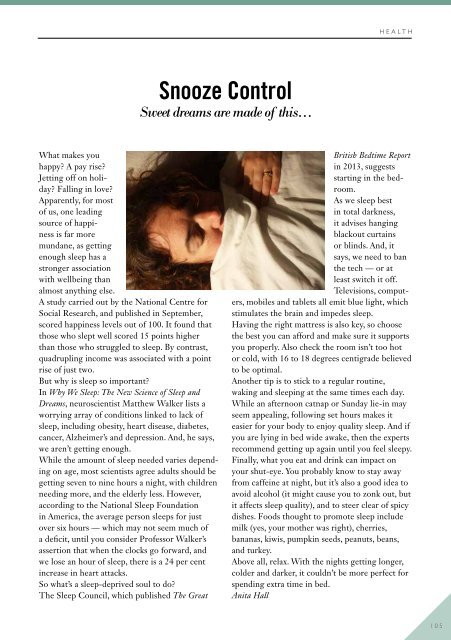Viva Lewes Issue #134 November 2017
You also want an ePaper? Increase the reach of your titles
YUMPU automatically turns print PDFs into web optimized ePapers that Google loves.
HEALTH<br />
Snooze Control<br />
Sweet dreams are made of this…<br />
What makes you<br />
happy? A pay rise?<br />
Jetting off on holiday?<br />
Falling in love?<br />
Apparently, for most<br />
of us, one leading<br />
source of happiness<br />
is far more<br />
mundane, as getting<br />
enough sleep has a<br />
stronger association<br />
with wellbeing than<br />
almost anything else.<br />
A study carried out by the National Centre for<br />
Social Research, and published in September,<br />
scored happiness levels out of 100. It found that<br />
those who slept well scored 15 points higher<br />
than those who struggled to sleep. By contrast,<br />
quadrupling income was associated with a point<br />
rise of just two.<br />
But why is sleep so important?<br />
In Why We Sleep: The New Science of Sleep and<br />
Dreams, neuroscientist Matthew Walker lists a<br />
worrying array of conditions linked to lack of<br />
sleep, including obesity, heart disease, diabetes,<br />
cancer, Alzheimer’s and depression. And, he says,<br />
we aren’t getting enough.<br />
While the amount of sleep needed varies depending<br />
on age, most scientists agree adults should be<br />
getting seven to nine hours a night, with children<br />
needing more, and the elderly less. However,<br />
according to the National Sleep Foundation<br />
in America, the average person sleeps for just<br />
over six hours — which may not seem much of<br />
a deficit, until you consider Professor Walker’s<br />
assertion that when the clocks go forward, and<br />
we lose an hour of sleep, there is a 24 per cent<br />
increase in heart attacks.<br />
So what’s a sleep-deprived soul to do?<br />
The Sleep Council, which published The Great<br />
British Bedtime Report<br />
in 2013, suggests<br />
starting in the bedroom.<br />
As we sleep best<br />
in total darkness,<br />
it advises hanging<br />
blackout curtains<br />
or blinds. And, it<br />
says, we need to ban<br />
the tech — or at<br />
least switch it off.<br />
Televisions, computers,<br />
mobiles and tablets all emit blue light, which<br />
stimulates the brain and impedes sleep.<br />
Having the right mattress is also key, so choose<br />
the best you can afford and make sure it supports<br />
you properly. Also check the room isn’t too hot<br />
or cold, with 16 to 18 degrees centigrade believed<br />
to be optimal.<br />
Another tip is to stick to a regular routine,<br />
waking and sleeping at the same times each day.<br />
While an afternoon catnap or Sunday lie-in may<br />
seem appealing, following set hours makes it<br />
easier for your body to enjoy quality sleep. And if<br />
you are lying in bed wide awake, then the experts<br />
recommend getting up again until you feel sleepy.<br />
Finally, what you eat and drink can impact on<br />
your shut-eye. You probably know to stay away<br />
from caffeine at night, but it’s also a good idea to<br />
avoid alcohol (it might cause you to zonk out, but<br />
it affects sleep quality), and to steer clear of spicy<br />
dishes. Foods thought to promote sleep include<br />
milk (yes, your mother was right), cherries,<br />
bananas, kiwis, pumpkin seeds, peanuts, beans,<br />
and turkey.<br />
Above all, relax. With the nights getting longer,<br />
colder and darker, it couldn’t be more perfect for<br />
spending extra time in bed.<br />
Anita Hall<br />
105


















